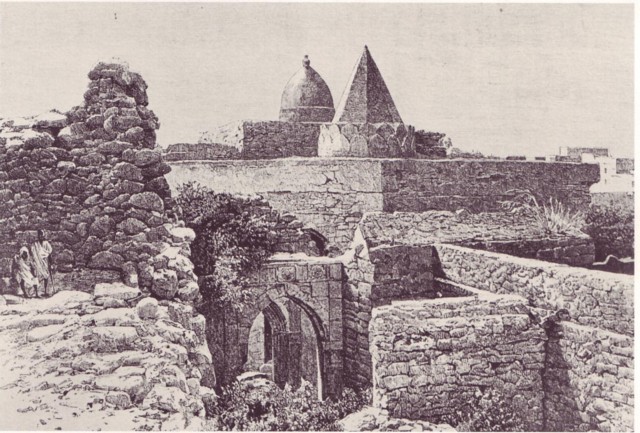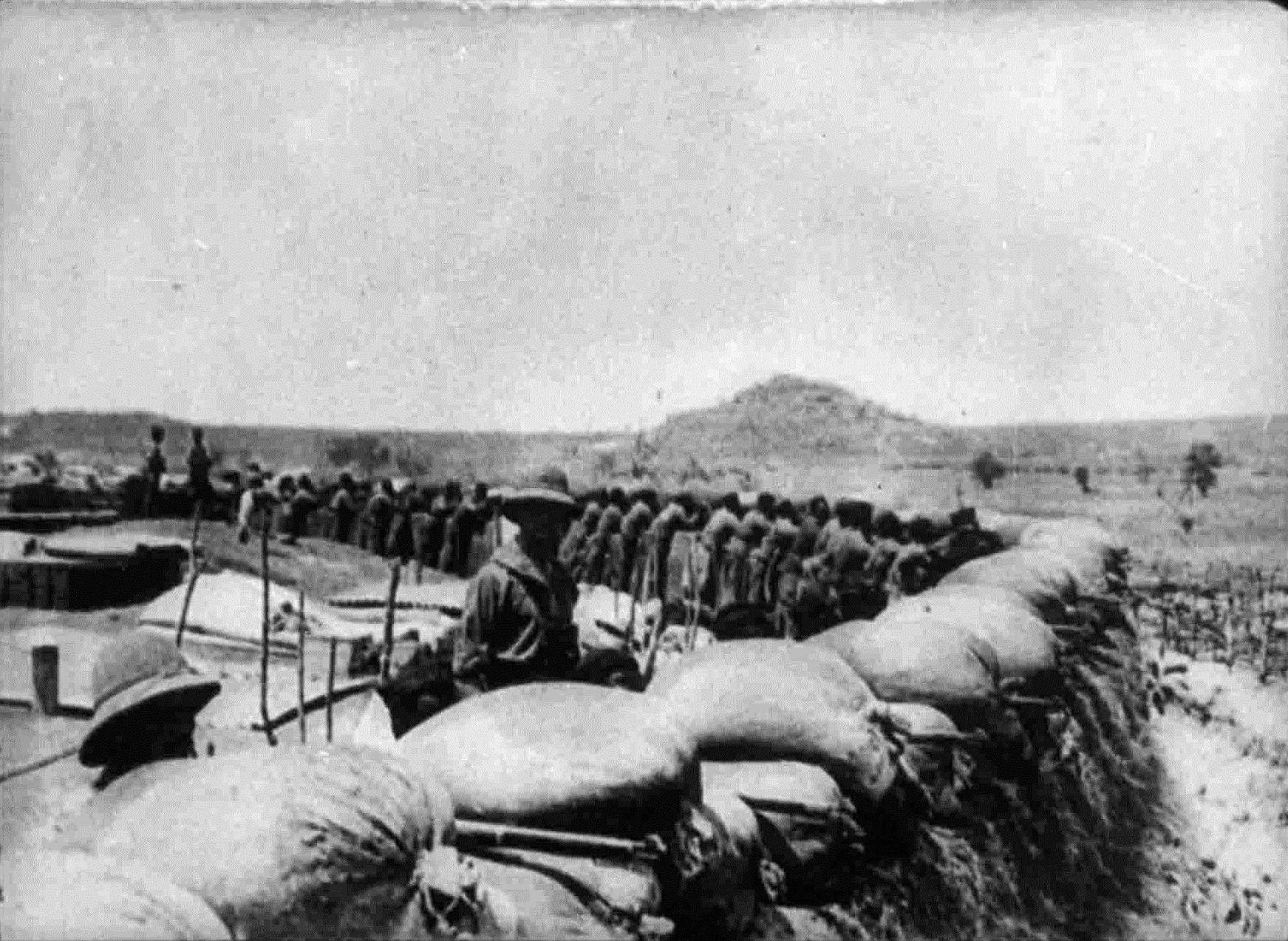|
Kyari Magumeri
Kyari Magumeri also known as Chari Maigumeri (c. 1897 – 1972) was a Nigerian soldier who fought in both World Wars. During the Great War, Magumeri served in the German Army. He received an Iron Cross medal but was later captured in Garua. After his release, he joined the Nigerian regiment and fought on the British side. He retired in 1953 and was given the honorary title of Captain. Life Maigumeri was from Borno State. In 1913, he crossed the border to Northern Cameroons and joined the German forces fighting Britain during World War I. In 1915, he was awarded the Iron Cross (2nd class) medal for his efforts in fighting through a British ambush upon the death of his German officer. Maigumeri was soon captured by the British in Garua and was taken to a prisoner of war camp. Upon his release in 1917, he offered to join the Nigeria Regiment. He was accepted by the British and after training, he was posted to the 3rd Battalion. He was given the rank of sergeant in 1920 and Company ... [...More Info...] [...Related Items...] OR: [Wikipedia] [Google] [Baidu] |
Great War
World War I (28 July 1914 11 November 1918), often abbreviated as WWI, was one of the deadliest global conflicts in history. Belligerents included much of Europe, the Russian Empire, the United States, and the Ottoman Empire, with fighting occurring throughout Europe, the Middle East, Africa, the Pacific, and parts of Asia. An estimated 9 million soldiers were killed in combat, plus another 23 million wounded, while 5 million civilians died as a result of military action, hunger, and disease. Millions more died in genocides within the Ottoman Empire and in the 1918 influenza pandemic, which was exacerbated by the movement of combatants during the war. Prior to 1914, the European great powers were divided between the Triple Entente (comprising France, Russia, and Britain) and the Triple Alliance (containing Germany, Austria-Hungary, and Italy). Tensions in the Balkans came to a head on 28 June 1914, following the assassination of Archduke Franz Ferdina ... [...More Info...] [...Related Items...] OR: [Wikipedia] [Google] [Baidu] |
Kanuri People
The Kanuri people (Kanouri, Kanowri, also Yerwa, Baribari and several subgroup names) are an List of ethnic groups of Africa, African ethnic group living largely in the lands of the former Kanem Empire, Kanem and Bornu Empires in Niger, Nigeria, Sudan, Libya and Cameroon. Those generally termed Kanuri include several subgroups and dialect groups, some of whom identify as distinct from the Kanuri. Most trace their origins to ruling lineages of the medieval Kanem-Bornu Empire, and its client states or provinces. In contrast to the neighboring Toubou people, Toubou or Zaghawa people, Zaghawa pastoralists, Kanuri groups have traditionally been sedentary, engaging in farming, fishing the Chad Basin, and engaged in trade and salt processing. Background Kanuri peoples include several subgroups, and identify by different names in some regions. The Kanuri language was the major language of the Bornu Empire and remains a major language in southeastern Niger, northeastern Nigeria and north ... [...More Info...] [...Related Items...] OR: [Wikipedia] [Google] [Baidu] |
People From Borno State
A person ( : people) is a being that has certain capacities or attributes such as reason, morality, consciousness or self-consciousness, and being a part of a culturally established form of social relations such as kinship, ownership of property, or legal responsibility. The defining features of personhood and, consequently, what makes a person count as a person, differ widely among cultures and contexts. In addition to the question of personhood, of what makes a being count as a person to begin with, there are further questions about personal identity and self: both about what makes any particular person that particular person instead of another, and about what makes a person at one time the same person as they were or will be at another time despite any intervening changes. The plural form "people" is often used to refer to an entire nation or ethnic group (as in "a people"), and this was the original meaning of the word; it subsequently acquired its use as a plural form of ... [...More Info...] [...Related Items...] OR: [Wikipedia] [Google] [Baidu] |
Nigerian Army Officers
Nigerians or the Nigerian people are citizens of Nigeria or people with ancestry from Nigeria. The name Nigeria was taken from the Niger River running through the country. This name was allegedly coined in the late 19th century by British journalist Flora Shaw, who later married Baron Frederick Lugard, a British colonial administrator. ''Nigeria'' is composed of various ethnic groups and cultures and the term Nigerian refers to a citizenship-based civic nationality. Nigerians derive from over 250 ethnic groups and languages.Toyin Falola. ''Culture and Customs of Nigeria''. Westport, Connecticut, USA: Greenwood Press, 2001. p. 4. Though there are multiple ethnic groups in Nigeria, economic factors result in significant mobility of Nigerians of multiple ethnic and religious backgrounds to reside in territories in Nigeria that are outside their ethnic or religious background, resulting in the mixing of the various ethnic and religious groups, especially in Nigeria's cities.Toyin Fa ... [...More Info...] [...Related Items...] OR: [Wikipedia] [Google] [Baidu] |
British West Africa
British West Africa was the collective name for British colonies in West Africa during the colonial period, either in the general geographical sense or the formal colonial administrative entity. British West Africa as a colonial entity was originally officially known as Colony of Sierra Leone and its Dependencies, then British West African Territories and finally British West African Settlements. The United Kingdom held varying parts of these territories or the whole throughout the 19th century. From west to east, the colonies became the independent countries of The Gambia, Sierra Leone, Ghana and Nigeria. Until independence, Ghana was referred to as the Gold Coast. Historical jurisdiction British West Africa constituted during two periods (17 October 1821, until its first dissolution on 13 January 1850, and again 19 February 1866, until its final demise on 28 November 1888) as an administrative entity under a governor-in-chief (comparable in rank to a governor-general), an ... [...More Info...] [...Related Items...] OR: [Wikipedia] [Google] [Baidu] |
British Empire Medal
The British Empire Medal (BEM; formerly British Empire Medal for Meritorious Service) is a British and Commonwealth award for meritorious civil or military service worthy of recognition by the Crown. The current honour was created in 1922 to replace the original medal, which had been established in 1917 as part of the Order of the British Empire. Award The British Empire Medal is granted in recognition of meritorious civil or military service. Recipients are entitled to use the post-nominal letters "BEM". Since December 1918, the honour has been divided into civil and military divisions in a similar way to the Order of the British Empire itself. While recipients are not members of the Order, the medal is affiliated to it. Between 1993 and 2012, the British Empire Medal was not awarded to subjects of the United Kingdom, although it continued to be awarded in some Commonwealth realms during that time. The practice of awarding the Medal to British subjects was resumed in June 2 ... [...More Info...] [...Related Items...] OR: [Wikipedia] [Google] [Baidu] |
82nd (West Africa) Division
The 82nd (West African) Division was formed under British control during the Second World War. It took part in the later stages of the Burma Campaign and was disbanded in Burma between May and September 1946. History Formation The inspiration for the division's formation came from General George Giffard. He had extensive experience of leading East African troops, and early in the Second World War became the commander of Britain's West Africa Command. He was eager for troops from Britain's African colonies to play their part in the war. When he was subsequently appointed to command India Command's Eastern Army, facing the Japanese army on the frontier between India and Burma, he requested that the two divisions being organised in West Africa be used in the Burma campaign. The division was formed from the existing 1st (West African) Infantry Brigade and 2nd (West African) Infantry Brigade, both of which had previously taken part in the East African Campaign in 1940 and 19 ... [...More Info...] [...Related Items...] OR: [Wikipedia] [Google] [Baidu] |
Ironsi
Johnson Thomas Umunnakwe Aguiyi-Ironsi (3 March 1924 – 29 July 1966) was the first military head of state of Nigeria. He seized power during the ensuing chaos after the 15 January 1966 military coup, which decapitated the country's leadership. He ruled from 16 January 1966 until his assassination by a group of mutinous Northern Nigerian officers and men who were led by Major Murtala Mohammed and included Captain Theophilus Danjuma, Lieutenant Muhammadu Buhari, Lieutenant Ibrahim Babangida and Lieutenant Sani Abacha in a revolt against his government in what was popularly called the July counter-coup. Early life Thomas Umunnakwe Aguiyi-Ironsi was born into the family of Mazi (Mr.) Ezeugo Aguiyi on the 3rd of March 1924, in Ibeku, Umuahia, Noé in Abia State, Nigeria. At the age of eight, he went to live with his older sister, Anyamma, who was married to Theophilius Johnson, a Sierra Leonean diplomat working in Umuahia. Aguiyi-Ironsi subsequently took the last name of his ... [...More Info...] [...Related Items...] OR: [Wikipedia] [Google] [Baidu] |
Mogadishu
Mogadishu (, also ; so, Muqdisho or ; ar, مقديشو ; it, Mogadiscio ), locally known as Xamar or Hamar, is the capital and List of cities in Somalia by population, most populous city of Somalia. The city has served as an important port connecting traders across the Indian Ocean for millennia, and has an estimated population of 2,388,000 (2021). Mogadishu is located in the coastal Banadir region on the Indian Ocean, which unlike other Somali regions, is considered a municipality rather than a (federal state). Mogadishu has a long history, which ranges from the Ancient history, ancient period up until the present, serving as the capital of the Sultanate of Mogadishu in the 9th-13th century, which for many centuries controlled the Indian Ocean gold trade, and eventually came under the Ajuran Empire in the 13th century which was an important player in the medieval Silk Road maritime trade. Mogadishu enjoyed the height of its prosperity during the 14th and 15th centuries a ... [...More Info...] [...Related Items...] OR: [Wikipedia] [Google] [Baidu] |
Second Battle Of Garua
The Second Battle of Garua took place from 31 May to 10 June 1915 during the Kamerun campaign of the First World War in Garua, German Kamerun. The battle was between a combined French and British force and defending German garrison and resulted in an Allied victory. Background Since the British failure at the First Battle of Garua in August 1914, the German force at Garua, under Captain von Crailsheim, had been afforded considerable freedom of movement. This was demonstrated by a series of incursions into British Nigeria which culminated in the Battle of Gurin in April 1915. This was one of the largest German raids into Nigeria, and shocked the recently appointed Allied commander in the region, Colonel Cunliffe.Bryce 1920, p. 416. The foray prompted a renewed British and French attempt to take the German forts at Garua. A British force under the command of Cunliffe arrived in Gurin the day after the battle, later joined by a French force. A 12-pounder gun was borrowed from the ... [...More Info...] [...Related Items...] OR: [Wikipedia] [Google] [Baidu] |
_1938.jpg)
_%2C_obverse.jpg)

